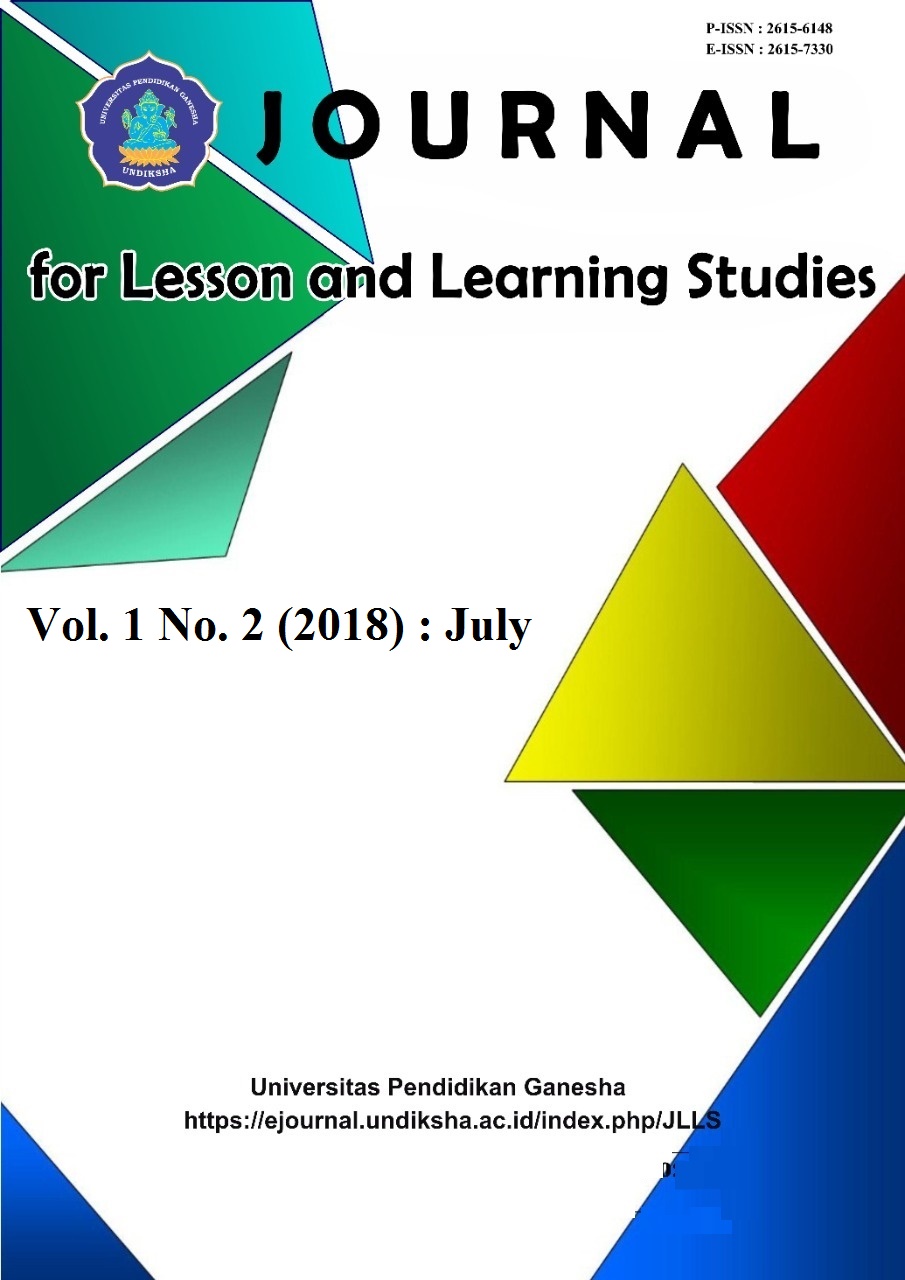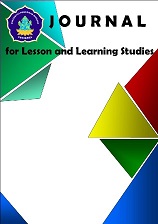PENGARUH MODEL PEMBELAJARAN KOOPERATIF TIPE ROLE PLAYING BERBASIS PENDIDIKAN KARAKTER TERHADAP KOMPETENSI PENGETAHUAN IPS SISWA KELAS V SD NEGERI GUGUS KAPTEN KOMPYANG SUJANA DENPASAR BARAT
DOI:
https://doi.org/10.23887/jlls.v1i2.14721Abstract
This research aimed to determine the influence of cooperative learning model type role playing based on character education against the competency knowledge of social science students fifth graders in SD Negeri Gugus Kapten Kompyang Sujana Denpasar Barat in years 2017/2018. This research is an experimental research with the research design is quasi-exsperimental design (nonequivalent control group design). The population in this research is all fifth graders in SD Negeri Gugus Kapten Kompyang Sujana Denpasar Barat in years 2017/2018 as many as 637 students. Research sample is determined by random sampling technique. The sample in this research is grade VC SD Negeri 9 Padangsambian as experimental group and grade VB SD Negeri 1 Padangsambian as control group. Social science knowledge competence control data is collected with instruments in the form of multiple choice test. Then the data is analyzed by t-test. The result of the analysis shows that there is a significant difference of social science knowledge competence among group of students who are tought using cooperative learning model type role playing based on character education and conventional learning of fifth graders in SD Negeri Gugus Kapten Kompyang Sujana Denpasar Barat in years 2017/2018. This is evidenced by the Tcount of = 9,079 and Ttable = 2,000 at the significant level of 5% with dk = n1+n2-2 (43+43-2=84). Similarly the average score of knowledge competence of social science students experimental group = 82,00 > = 65,01 average of social science knowledge competence of control group students. Thus it can be concluded that the application of cooperative learning model type role playing based on character education influence the knowledge competence of social science fifth grade in SD Negeri Gugus Kapten Kompyang Sujana Denpasar Barat in years 2017/2018.References
Agung, A.A Gede. 2016. Statistik Dasar Untuk Pendidikan. Yogyakarta: Depublish.
Annur, Fauzi. 2016. “Pendidikan Karakter Berbasis Keagamaan (Studi Kasus di SDTT Nur Hidayah Surakarta)” Jurnal Pendidikan dan Pengajaran. Volume 01 Nomor 01 (hlm 39-56).
Arikunto, Suharsimi. 2012. Dasar-dasar Evaluasi Pendidikan. Jakarta: PT Bumi Aksara.
BSNP. 2006. Standar Isi untuk Satuan Pendidikan Dasar dan Menengah. Jakarta: Badan Standar Pendidikan Nasional.
Darmadi, Hamid. 2014. Metode Penelitian Pendidikan dan Sosial. Bandung: Alfabeta.
Huda, Miftahul. 2015. Model Model Pengajaran dan Pembelajaran. Yogyakarta: Pustaka Belajar.
Kurniasih, Imas dan Berlin Sani. 2015. Ragam Pengembangan Model Pembelajaran. Kata Pena CV Solusi Distribusi.
Nurhasanah, Ismawati Alidha. 2016. “Penerapan Metode Role Playing Untuk Meningkatkan Hasil Belajar Siswa Pada Materi Hubungan Makhluk Hidup Dengan Lingkungannya”. Jurnal Pena Ilmiah. Volume 1 Nomor 1, (hlm. 611-620).
Setyosari, Punaji. 2015. Metode Penelitian Pendidikan dan Pengembangan. Jakarta: Kencana Prenada Media Group.
Wartini, Ida Ayu Km Mirah. 2014. “Pengaruh Implementasi Pendekatan Saintifik Terhadap Sikap Sosial dan Hasil Belajar PKn di Kelas VI SD Jemabatan Budaya, Kuta”. Jurnal Pendidikan dan Pengajaran. Volume 4, (hlm.1-11).
Downloads
Published
How to Cite
Issue
Section
License
Authors who publish with the Journal for Lesson and Learning Studies agree to the following terms:
- Authors retain copyright and grant the journal the right of first publication with the work simultaneously licensed under a Creative Commons Attribution License (CC BY-SA 4.0) that allows others to share the work with an acknowledgment of the work's authorship and initial publication in this journal.
- Authors are able to enter into separate, additional contractual arrangements for the non-exclusive distribution of the journal's published version of the work (e.g., post it to an institutional repository or publish it in a book), with an acknowledgment of its initial publication in this journal.
- Authors are permitted and encouraged to post their work online (e.g., in institutional repositories or on their website) prior to and during the submission process, as it can lead to productive exchanges, as well as earlier and greater citation of published work. (See The Effect of Open Access)





